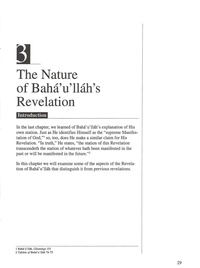The Significance of Bahá’u’lláh’s Revelation/The Nature of The Station of Bahá’u’lláh’s Revelation
The text below this notice was generated by a computer, it still needs to be checked for errors and corrected. If you would like to help, view the original document by clicking the PDF scans along the right side of the page. Click the edit button at the top of this page (notepad and pencil icon) or press Alt+Shift+E to begin making changes. When you are done press "Save changes" at the bottom of the page. |
The Nature
of Baha’u’llah’s Revelation
In the last chapter, we learned of Baha’u’llah’s explanation of His own station. Just as He identifies Himself as the “supreme Manifestation of God,” so, too, does He make a similar claim for His Revelation. “In truth,” He states, “the station of this Revelation transcendeth the station of whatever hath been manifested in the past or will be manifested in the future.”
In this chapter we will examine some of the aspects of the Revelation of Baha’u’lléh that distinguish it from previous revelations.
1 Baha’u’llah, Gleanings 151 2 Tablets of Bahd’u’lléh 74-75
29
[Page 30]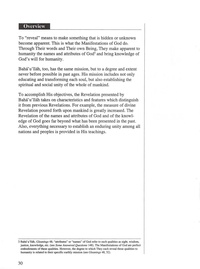 Overview
Overview
To “reveal” means to make something that is hidden or unknown become apparent. This is what the Manifestations of God do. Through Their words and Their own Being, They make apparent to humanity the names and attributes of God? and bring knowledge of God’s will for humanity.
Baha’u’llah, too, has the same mission, but to a degree and extent never before possible in past ages. His mission includes not only educating and transforming each soul, but also establishing the spiritual and social unity of the whole of mankind.
To accomplish His objectives, the Revelation presented by Baha’u’llah takes on characteristics and features which distinguish it from previous Revelations. For example, the measure of divine Revelation poured forth upon mankind is greatly increased. The Revelation of the names and attributes of God and of the knowledge of God goes far beyond what has been presented in the past. Also, everything necessary to establish an enduring unity among all nations and peoples is provided in His teachings.
3 Baha’ u’llah, Gleanings 48; “attributes” or “names” of God refer to such qualities as sight, wisdom, justice, knowledge, etc. (see Some Answered Questions 148). The Manifestations of God are perfect embodiments of these qualities. However, the degree to which They each reveal these qualities to humanity is related to their specific earthly mission (see Gleanings 48, 52).
30
[Page 31]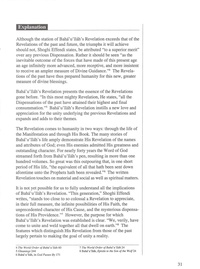 Explanation
Explanation
Although the station of Baha’u’llah’s Revelation exceeds that of the Revelations of the past and future, the triumphs it will achieve should not, Shoghi Effendi states, be attributed “to a superior merit” over any previous Dispensation. Rather it should be seen “as the inevitable outcome of the forces that have made of this present age an age infinitely more advanced, more receptive, and more insistent to receive an ampler measure of Divine Guidance.”* The Revelations of the past have thus prepared humanity for this new, greater measure of divine blessings.
Baha’u’1lah’s Revelation presents the essence of the Revelations gone before. “In this most mighty Revelation, He states, “all the Dispensations of the past have attained their highest and final consummation.” Baha’u’lléh’s Revelation instills a new love and appreciation for the unity underlying the previous Revelations and
expands and adds to their themes.
The Revelation comes to humanity in two ways: through the life of the Manifestation and through His Book. The many stories of Baha’u ’llah’s life amply demonstrate His Revelation of the names and attributes of God; even His enemies admitted His greatness and outstanding character. For nearly forty years the Word of God streamed forth from Baha’u’lldh’s pen, resulting in more than one hundred volumes. So great was this outpouring that, in one short period of His life, “the equivalent of all that hath been sent down aforetime unto the Prophets hath been revealed.”® The written
Revelation touches on material and social as well as spiritual matters.
It is not yet possible for us to fully understand all the implications of Baha’u’llah’s Revelation. “This generation,” Shoghi Effendi writes, “stands too close to so colossal a Revelation to appreciate, in their full measure, the infinite possibilities of His Faith, the unprecedented character of His Cause, and the mysterious dispensations of His Providence.’”” However, the purpose for which Baha’u’llah’s Revelation was established is clear. “We, verily, have come to unite and weld together all that dwell on earth.”® The features which distinguish His Revelation from those of the past largely pertain to making the goal of unity a reality.
4 The World Order of Baha’u’llah 60 7 The World Order of Baha'u'llah 24 5 Gleanings 244 8 Baha’u lah, Epistle to the Son of the Wolf 24 6 Baha’u’llah, in God Passes By 171
31
[Page 32]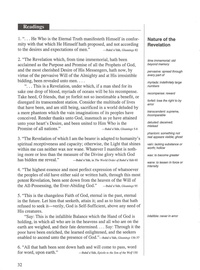 1. “. .. He Who is the Eternal Truth manifesteth Himself in conformity with that which He Himself hath proposed, and not according
to the desires and expectations of men.” —Baha’u’llah, Gleanings 82
1. “. .. He Who is the Eternal Truth manifesteth Himself in conformity with that which He Himself hath proposed, and not according
to the desires and expectations of men.” —Baha’u’llah, Gleanings 82
2. “The Revelation which, from time immemorial, hath been acclaimed as the Purpose and Promise of all the Prophets of God, and the most cherished Desire of His Messengers, hath now, by virtue of the pervasive Will of the Almighty and at His irresistible bidding, been revealed unto men. ...
“.. This is a Revelation, under which, if a man shed for its sake one drop of blood, myriads of oceans will be his recompense. Take heed, O friends, that ye forfeit not so inestimable a benefit, or disregard its transcendent station. Consider the multitude of lives that have been, and are still being, sacrificed in a world deluded by a mere phantom which the vain imaginations of its peoples have conceived. Render thanks unto God, inasmuch as ye have attained unto your heart’s Desire, and been united to Him Who is the Promise of all nations.” —Bahé’w’llah, Gleanings 5-6
3. “The Revelation of which I am the bearer is adapted to humanity’s spiritual receptiveness and capacity; otherwise, the Light that shines within me can neither wax nor wane. Whatever I manifest is nothing more or less than the measure of the Divine glory which God has bidden me reveal.” —Bahda’w’lldh, in The World Order of Bahd’u’lldh 60
4. “The highest essence and most perfect expression of whatsoever the peoples of old have either said or written hath, through this most potent Revelation, been sent down from the heaven of the Will of the All-Possessing, the Ever-Abiding God.” = —Baha’u’llah, Gleanings 95
5. “This is the changeless Faith of God, eternal in the past, eternal in the future. Let him that seeketh, attain it; and as to him that hath refused to seek it—verily, God is Self-Sufficient, above any need of His creatures.
“Say: This is the infallible Balance which the Hand of God is holding, in which all who are in the heavens and all who are on the earth are weighed, and their fate determined. ... Say: Through it the poor have been enriched, the learned enlightened, and the seekers enabled to ascend unto the presence of God.”—Baha’w'llah, Gleanings 136-37
6. “All that hath been sent down hath and will come to pass, word for word, upon earth.” —Bahé’u’llah, Epistle to the Son of the Wolf 150
32
Nature of the Revelation
time immemorial: old beyond memory
pervasive: spread through every part of
myriads: indefinitely large numbers
recompense: reward
forfeit: lose the right to by error
transcendent: supreme, incomparable
deluded: deceived; mislead
phantom: something not real appears visible; ghost
vain: lacking substance or worth; hollow
wax: to become greater
wane: to lessen in force or intensity
infallible: never in error
[Page 33]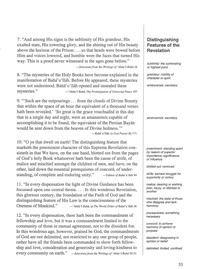 7. “And among His signs is the sublimity of His grandeur, His
exalted state, His towering glory, and the shining out of His beauty
above the horizon of the Prison: ... so that heads were bowed before
Him and voices lowered, and humble were the faces that turned His
way. This is a proof never witnessed in the ages gone before.”
—Selections from the Writings of ‘Abdu’l-Bahd 16
7. “And among His signs is the sublimity of His grandeur, His
exalted state, His towering glory, and the shining out of His beauty
above the horizon of the Prison: ... so that heads were bowed before
Him and voices lowered, and humble were the faces that turned His
way. This is a proof never witnessed in the ages gone before.”
—Selections from the Writings of ‘Abdu’l-Bahd 16
8. “The mysteries of the Holy Books have become explained in the manifestation of Baha’u’llah. Before He appeared, these mysteries were not understood. Baha’u’llah opened and unsealed these
mysteries.” —‘Abdu’1-Baha, The Promulgation of Universal Peace 197
9. “Such are the outpourings . . . from the clouds of Divine Bounty that within the space of an hour the equivalent of a thousand verses hath been revealed.’ ‘So great is the grace vouchsafed in this day that in a single day and night, were an amanuensis capable of accomplishing it to be found, the equivalent of the Persian Bayan
would be sent down from the heaven of Divine holiness.’” —Baha’w’llah, in God Passes By 171
10. “O ye that dwell on earth! The distinguishing feature that marketh the preeminent character of this Supreme Revelation consisteth in that We have, on the one hand, blotted out from the pages of God’s holy Book whatsoever hath been the cause of strife, of malice and mischief amongst the children of men, and have, on the other, laid down the essential prerequisites of concord, of understanding, of complete and enduring unity.” —Tablets of Bahd’u'lldh 94
11. “In every dispensation the light of Divine Guidance has been focussed upon one central theme. . . . In this wondrous Revelation, this glorious century, the foundation of the Faith of God and the distinguishing feature of His Law is the consciousness of the Oneness of Mankind.” —‘Abdu’l-Bahé, in The World Order of Bahd’u’lléh 36
12. “In every dispensation, there hath been the commandment of fellowship and love, but it was a commandment limited to the community of those in mutual agreement, not to the dissident foe. In this wondrous age, however, praised be God, the commandments of God are not delimited, not restricted to any one group of people, rather have all the friends been commanded to show forth fellowship and love, consideration and generosity and loving-kindness to every community on earth.” —selections from the Writings of ‘Abdu’l-Bahd 20-21
Distinguishing Features of the Revelation
sublimity: the culminating or highest point
grandeur: nobility of character or spirit
amanuensis: secretary
amanuensis: secretary
preeminent: standing apart by reason of superior importance, significance, or influence
blotted out: removed
Strife: earnest struggle for superiority or victory
malice: desiring or wishing pain, injury, or distress to another
mischief: the state of those who disagree and lack harmony
prerequisites: something necessary
concord: to achieve harmony of opinion or purpose
dissident: disagreeing in opinion or belief
delimited: limited, confined
33
[Page 34]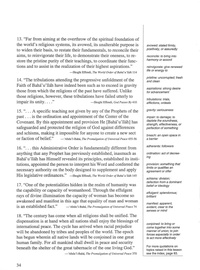 13. “Far from aiming at the overthrow of the spiritual foundation of
the world’s religious systems, its avowed, its unalterable purpose is
to widen their basis, to restate their fundamentals, to reconcile their
aims, to reinvigorate their life, to demonstrate their oneness, to restore the pristine purity of their teachings, to coordinate their functions and to assist in the realization of their highest aspirations.”
—Shoghi Effendi, The World Order of Bahd’u’lldh 114
13. “Far from aiming at the overthrow of the spiritual foundation of
the world’s religious systems, its avowed, its unalterable purpose is
to widen their basis, to restate their fundamentals, to reconcile their
aims, to reinvigorate their life, to demonstrate their oneness, to restore the pristine purity of their teachings, to coordinate their functions and to assist in the realization of their highest aspirations.”
—Shoghi Effendi, The World Order of Bahd’u’lldh 114
14. “The tribulations attending the progressive unfoldment of the Faith of Baha’u’ lah have indeed been such as to exceed in gravity those from which the religions of the past have suffered. Unlike those religions, however, these tribulations have failed utterly to impair its unity... .” —Shoghi Effendi, God Passes By 410
15. “... A specific teaching not given by any of the Prophets of the past . . . is the ordination and appointment of the Center of the Covenant. By this appointment and provision He [Baha’u’ 14h] has safeguarded and protected the religion of God against differences and schisms, making it impossible for anyone to create a new sect or faction of belief.” —‘Abdu’|-Baha, The Promulgation of Universal Peace 455-56
16. “. . . this Administrative Order is fundamentally different from anything that any Prophet has previously established, inasmuch as Baha’u’llah has Himself revealed its principles, established its institutions, appointed the person to interpret his Word and conferred the necessary authority on the body designed to supplement and apply His legislative ordinances.” —shoghi Effendi, The World Order of Baha'u'llah 145
17. “One of the potentialities hidden in the realm of humanity was the capability or capacity of womanhood. Through the effulgent rays of divine illumination the capacity of woman has become so awakened and manifest in this age that equality of man and woman is an established fact.” —‘Abdu’1-Baha, The Promulgation of Universal Peace 74
18. “The century has come when all religions shall be unified. The dispensation is at hand when all nations shall enjoy the blessings of international peace. The cycle has arrived when racial prejudice will be abandoned by tribes and peoples of the world. The epoch has begun wherein all native lands will be conjoined in one great human family. For all mankind shall dwell in peace and security beneath the shelter of the great tabernacle of the one living God.” —‘Abdu’1-Baha, The Promulgation of Universal Peace 370
34
avowed: stated firmly, positively, or assuredly
reconcile: to bring into harmony or accord
reinvigorate: give renewed life or energy to
pristine: uncorrupted; fresh and clean
aspirations: strong desire for advancement
tribulations: trials, afflictions, ordeals
gravity: seriousness
impair: to damage; to deplete the soundness, strength, effectiveness, or perfection of something
breach: an open space in a barrier
adherents: followers
ordination: act of decreeing
provision: something that limits or qualifies an agreement or offer
schisms: division; defection from a dominant belief or ideology
effulgent: splendorous; brilliant
manifest: apparent, evident, clear to the senses or mind
conjoined: to bring or come together into some manner of union; to join forces especially in order to act more effectively
For more quotations on topics raised in this lesson
see the index, page 83.
[Page 35]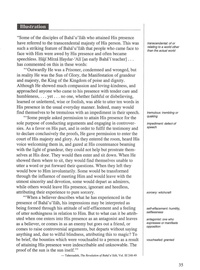 “Some of the disciples of Baha’u’ll4h who attained His presence
have referred to the transcendental majesty of His person. This was
such a striking feature of Baha’u’llah that people who came face to
face with Him were awed by His presence and often became
speechless. Haji Mirza Haydar-‘Ali [an early Baha’i teacher]...
has commented on this in these words:
“Some of the disciples of Baha’u’ll4h who attained His presence
have referred to the transcendental majesty of His person. This was
such a striking feature of Baha’u’llah that people who came face to
face with Him were awed by His presence and often became
speechless. Haji Mirza Haydar-‘Ali [an early Baha’i teacher]...
has commented on this in these words:
““Outwardly He was a Prisoner, condemned and wronged, but in reality He was the Sun of Glory, the Manifestation of grandeur and majesty, the King of the Kingdom of poise and dignity. Although He showed much compassion and loving-kindness, and approached anyone who came to his presence with tender care and humbleness, .. . yet... no one, whether faithful or disbelieving, learned or unlettered, wise or foolish, was able to utter ten words in His presence in the usual everyday manner. Indeed, many would find themselves to be tremulous with an impediment in their speech.
“““Some people asked permission to attain His presence for the sole purpose of conducting arguments and engaging in controversies. As a favor on His part, and in order to fulfil the testimony and to declare conclusively the proofs, He gave permission to enter the court of His majesty and glory. As they entered the room, heard His voice welcoming them in, and gazed at His countenance beaming with the light of grandeur, they could not help but prostrate themselves at His door. They would then enter and sit down. When He showed them where to sit, they would find themselves unable to utter a word or put forward their questions. When they left they would bow to Him involuntarily. Some would be transformed through the influence of meeting Him and would leave with the utmost sincerity and devotion, some would depart as admirers, while others would leave His presence, ignorant and heedless, attributing their experience to pure sorcery.
“When a believer describes what he has experienced in the presence of Baha’u’ lah, his impressions may be interpreted as being formed through his attitude of self-effacement and a feeling of utter nothingness in relation to Him. But to what can it be attributed when one enters into His presence as an antagonist and leaves as a believer, or comes in as an enemy but goes out a friend, or comes to raise controversial arguments, but departs without saying anything and, due to wilful blindness, attributing this to magic? To be brief, the bounties which were vouchsafed to a person as a result of attaining His presence were indescribable and unknowable. The
proof of the sun is the sun itself.’” —Taherzadeh, The Revelation of Bahd’u’ lldh, Vol. 111 248-49
transcendental: of or relating to a world other than the actual world
tremulous: trembling or quaking
impediment: defect of speech
sorcery: witchcraft
self-effacement: humility, selflessness
antagonist: one who expresses or manifests opposition
vouchsafed: granted
35
[Page 36]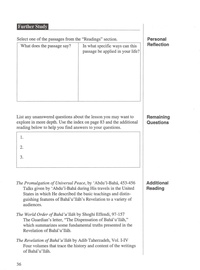 iy
iy
Select one of the passages from the “Readings” section.
What does the passage say? In what specific ways can this passage be applied in your life?
List any unanswered questions about the lesson you may want to explore in more depth. Use the index on page 83 and the additional reading below to help you find answers to your questions.
1,
2
3.
The Promulgation of Universal Peace, by ‘Abdu’1-Baha, 453-456 Talks given by ‘Abdu’1-Baha during His travels in the United States in which He described the basic teachings and distinguishing features of Baha’u’llah’s Revelation to a variety of audiences.
The World Order of Baha’u’llah by Shoghi Effendi, 97-157 The Guardian’s letter, “The Dispensation of Baha’u’ lah,” which summarizes some fundamental truths presented in the Revelation of Baha’u’ lah.
The Revelation of Bahd’u’llah by Adib Taherzadeh, Vol. I-IV Four volumes that trace the history and content of the writings of Baha’u lah.
36
Personal Reflection
Remaining Questions
Additional
Reading
[Page 37]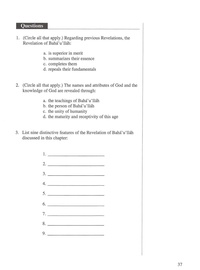 1.
1.
(Circle all that apply.) Regarding previous Revelations, the Revelation of Baha’u ’1lah:
. 18 superior in merit
. Summarizes their essence completes them
. repeals their fundamentals
aAo¢cp
(Circle all that apply.) The names and attributes of God and the knowledge of God are revealed through:
a. the teachings of Baha’u’llah
b. the person of Baha’u’llah
c. the unity of humanity
d. the maturity and receptivity of this age
List nine distinctive features of the Revelation of Baha’u’llah discussed in this chapter:
aT
[Page 38]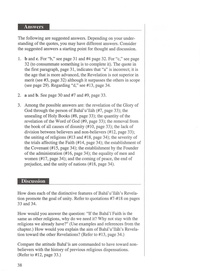 The following are suggested answers. Depending on your understanding of the quotes, you may have different answers. Consider
the suggested answers a starting point for thought and discussion.
The following are suggested answers. Depending on your understanding of the quotes, you may have different answers. Consider
the suggested answers a starting point for thought and discussion.
1. bandc. For “b,” see page 31 and #4 page 32. For “c,” see page 32 (to consummate something is to complete it). The quote in the first paragraph, page 31, indicates that “a” is incorrect; it is the age that is more advanced, the Revelation is not superior in merit (see #3, page 32) although it surpasses the others in scope
(see page 29). Regarding “d,” see #13, page 34. 2. aand b. See page 30 and #7 and #9, page 33.
3. Among the possible answers are: the revelation of the Glory of God through the person of Baha’u’ lah (#7, page 33); the unsealing of Holy Books (#8, page 33); the quantity of the revelation of the Word of God (#9, page 33); the removal from the book of all causes of disunity (#10, page 33); the lack of division between believers and non-believers (#12, page 33); the uniting of religions (#13 and #18, page 34); the severity of the trials affecting the Faith (#14, page 34); the establishment of the Covenant (#15, page 34); the establishment by the Founder of the administration (#16, page 34); the equality of men and women (#17, page 34); and the coming of peace, the end of prejudice, and the unity of nations (#18, page 34).
Discussion
How does each of the distinctive features of Baha’u’llah’s Revelation promote the goal of unity. Refer to quotations #7-#18 on pages 33 and 34.
How would you answer the question: “If the Baha’i Faith is the same as other religions, why do we need it? Why not stay with the religions we already have?” (Use examples and references from the
chapter.) How would you explain the aim of Baha’u’llah’s Revelation toward the other Revelations? (Refer to #13, page 34.)
Compare the attitude Baha’is are commanded to have toward non believers with the history of previous religious dispensations. (Refer to #12, page 33.)
38
